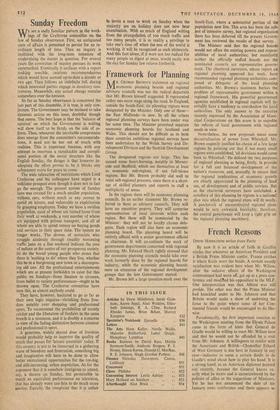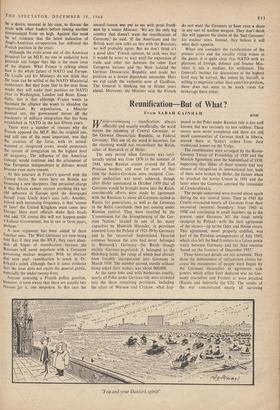French Reasons
DREW MIDDLETON writes from Paris:
By now it is an article of faith in Gaullist circles that whenever an American President and a British Prime Minister confer, France catches it where Katie wore the beads. A certain moody satisfaction was evident here when Mr. Wilson, after the sedative effects of the Washington communique had worn off, got up at a press con- ference and modified his opposition to the MLF. One interpretation was that Albion was still perfide. The other was that the Prime Minister had knuckled under to Mr. Johnson and that Britain would make a show of endorsing the force to the point where some of her Con- tinental friends would be encouraged to do like- wisea
Paradoxically, the first important reaction to the Washington meeting from the Elysde Palace came in the form of hints that General de Gaulle would be willing to meet Mr. Wilson here and that he would not be offended by a visit from Mr. Johnson. A willingness to confer with the Americans and British—Chancellor Erhard of West Germany is due here in January in any case—indicates to some a certain doubt in de Gaulle's mind about how to play his hand. It is a strong hand, as an American diplomat pointed out recently, because the General knows ex- actly what he wants and is unencumbered by the policies of allies or the suggestions of Ministers. Yet he has not announced the date of his January news conference and there appears to be a desire, •unusual. in his case, to discuss the crisis with other leaders before issuing another communique from on high. Against this must be set evidence that the latest indication of Anglo-American co-operation has stiffened the French position in the crisis.
Although the crisis arose out of the American Proposal for an MLF, no one in authority here pretends any longer that this is the main issue of the dispute. What France is talking about now is the whole future of NATO and Europe. be Gaulle and his Ministers do not think that the issue can be settled at the NATO' Ministerial conference. But they hope that in the next three weeks they will make their position on NATO clear. to Washington, London and Bonn. Essen- tially, this is that although France wants to maintain the alliance she wants to abandon the organisation. By organisation, a Minister Pointed out, the government means all the machinery of military integration that has been established in NATO in the last fifteen years.
There were a number of reasons why the French opposed the MLF. But ,the original one, and still' one of the most important, was that the creation of the force, with its mixed- manned or integrated crews, would perpetuate the system of integration on the highest level of weaponry. The influence of this American concept would continue and the, attainment of true European independence in defence would become even more remote.
. At this juncture in. France's quarrel with the. United States, the views here on Britain are assuming a new sharpness. One persistent charge is that Britain cannot recover anything like her old influence in Europe until she disengages herself from Uncle Sam's coat tails. Another, Voiced with increasing frequency, is that 'sooner or later' the United. Kingdom must come into Europe.' Here most officials shake their heads and add, 'Of course this will not happen .under a Labour Government, but in two or three years,. perhaps.'
A new argument has been added to these familiar ones. The West Germans are now being told that if they join the MLF, they must aban- don all hopes of reunification because the Russians will never negotiate with a Germany Possessing nuclear weapons. With an election due next year, reunification is much in Dr. Erhard's mind, although there is some evidence that the issue does not excite the general public, especially' the under-twenty-fives.
Anyone assessing a French policy position, however, is soon aware that there are usually two reasons for it, one unspoken. In this case the second reason was put to me with great frank- ness by a senior Minister. 'We' are the only big country that doesn't want the reunification of Germany,' he said. 'If the Americans and the British want new talks on this with the Russians, we will probably agree. But we don't think it's a good idea.' French opinion, he said, was that it would be wiser to wait until the expansion of trade and other ties between the other East European nations and the West isolated the German Democratic Republic and made her position as a Soviet dependant untenable. Here we can catch the authentic. note of Gaullism. The General is thinking ten or fifteen years ahead. Moreover, the Minister said, the French do not want the Germans to have even a share in any sort of nuclear. weapon. They don't think this will 'appease the desire of the. 'bad Germans' for nuclear arms. Instead, they believe it will whet their appetite.
When one considers 'the ramifications of the present crisis and the steadily rising stakes in the game, it is quite clear that NATO with its platoons of foreign, defence and finance Min- isters is not a medium for settlement. The General's instinct for discussions at the highest level may be correct. But unless he, himself, is willing to negotiate rather than assert his position, there does not • seem to be much room for brokerage there either..





























 Previous page
Previous page